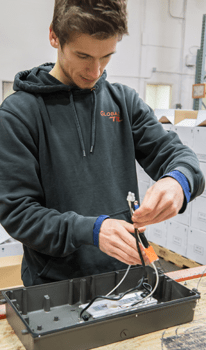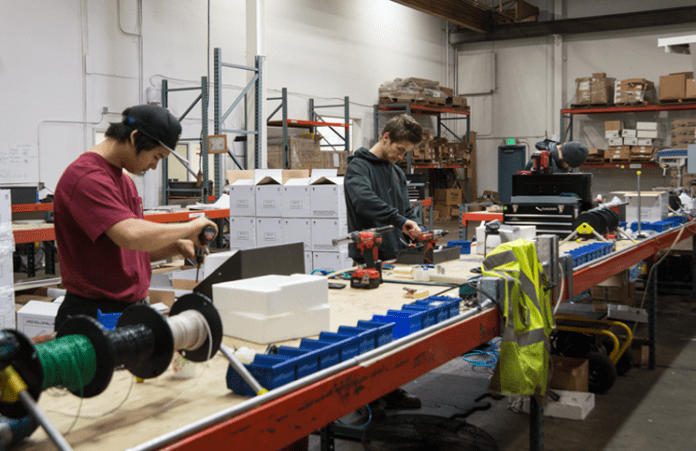Whether a trend or simply good business practice, more and more Clark County businesses are applying the popular ‘buy local’ principle to their organizations and, according to Terry Grover, CEO of EnviroLux, the results are synergistic.
EnviroLux, a subsidiary of Dura Trade established in 1989, is at the top of the Department of Energy’s list for LED efficiency. In 2013, they established an exclusive agreement with Camas-based EcoGrow Lighting to distribute EnviroLux’s patented magnetized LED light bar. In turn, EcoGrow installed over 3,500 of these light bars with interchangeable modules at Battle Ground-based Agrijuana which, consequently, reaped $250,000 in energy rebates for their investment.
“It has improved our business locally, even though we’re national in sales, because we can use them (Agrijuana) as an example because they’re using our product in a local Clark County facility and the effect of this garnered them a $250,000 rebate,” Grover said.” We’re able to point to these local resources when explaining the benefits, program, etcetera.”
Stella Sun, marketing director for SunModo Corporation, said that they’ve been partnering with local businesses for years. A Vancouver company that specializes in solar racking systems, SunModo has found their customers offer the best insight on how to improve their product and one of those customers is Brimma Solar.
 “We’re neighbors with a solar installation company. Sometimes they drop by the office and say ‘Hey, we’re having this problem installing and thought we’d offer a suggestion on manufacturing,’” Sun said.
“We’re neighbors with a solar installation company. Sometimes they drop by the office and say ‘Hey, we’re having this problem installing and thought we’d offer a suggestion on manufacturing,’” Sun said.
The fact that SunModo has a solar installation neighbor is no accident. John Harley, vice president of Brimma Solar, explained that he met SunModo’s owner at a Los Angeles trade show, began trying their product and was impressed with the quality and its practical capabilities.
When Brimma Solar moved their warehouse operations to a space across from SunModo, the benefits of working with another Vancouver-based company increased dramatically.
“Some of the racking components can be 20 feet long. Now I can walk across the street and pick up (product),” Harley said. “Tony Liu (SunModo’s owner) makes a very good product and he thinks about it and bounces ideas off us ‘cuz we’re in the field installing it. He’s always been able to change it to our needs and the needs of the solar community.”
Harley used to ship from New Mexico and California and said the savings in shipping, time the product now spends en route, elimination of possible damage to racking components during shipping and additional labor costs to put components together if they weren’t in one piece when they arrived have all added up to a difference in his budget and productivity level. As a bonus, money that was being filtered out of state now stays in the local economy.
He noted that other synergistic components have been SunModo connecting Brimma Solar with module and inverter suppliers that Harley was unfamiliar with and Brimma making itself available to new installers of SunModo products to testify that the products are easy to work with and of the highest quality.
Brimma Solar utilizes an inverter manufacturer out of Poulsbo, Washington and North Coast Electric in Vancouver for modules.
“I used to buy everything out of California for the first couple years. Now I buy everything local,” Harley said.
Sun shared that SunModo chooses to use Portland-based packaging logistics company Landsberg Orora, and prefers the services of local print shop, PIP Printing, as well. She pointed out that the face-to-face communication promotes greater accuracy with orders, a stronger working relationship, orders are received sooner and these factors add value to her company’s bottom line.
“If I have a choice between doing business locally or with a vendor in another state, I’ll choose local even if the price is higher overall,” Sun said.
Collaborative ventures are not solely geared to larger companies or a particular industry, however.
Instead of buying brownies from a national chain grocery store, Cellar 55 Tasting Room called on Bleu Door Bakery at a recent Valentine’s weekend event. Michelle Brinning, owner of Cellar 55 and Bonnie Brasure, owner of Bleu Door, have worked together in the past pairing Brinning’s wines with Brasure’s baked goods.
As downtown Vancouver small business owners, both ladies met through patronizing one another’s shops. Brasure has seen results from the exposure of her products offered in a different location and is excited to showcase Cellar 55’s wines when the expansion of Bleu Door Bakery is complete and evening hours are added.
“I see Michelle and I working together for the long-haul because I’ll be open nights and she is too. I totally believe in collaborating with other businesses. She does things that I don’t do and I do things that she doesn’t do and all it’s going to be is a win-win. I found a landscaper today because of us working together,” Brasure laughed.
Max Ault, business development manager with Columbia River Economic Development Council (CREDC), offered advice for organizations seeking to partner locally.
“Agreeing to create and maintain business partnerships is a key component to growth and expansion. However, like all partnerships and relationships, it is critically important to be intimately familiar with who and what you will be getting involved with,” Ault said. “Open and clear communication from the beginning is critical to minimizing misunderstandings and ensuring long lasting and fruitful partnerships.




